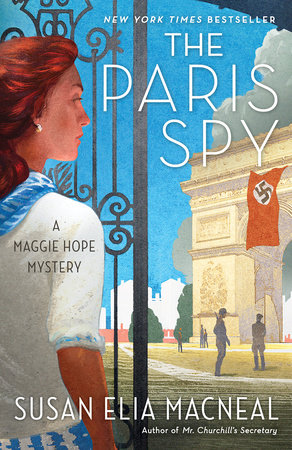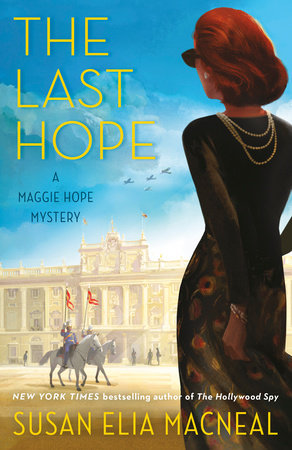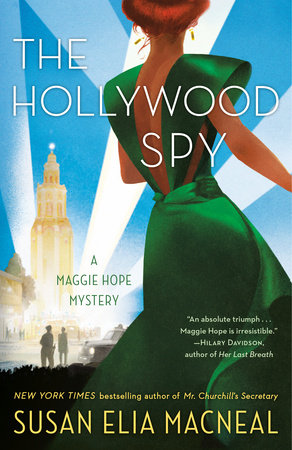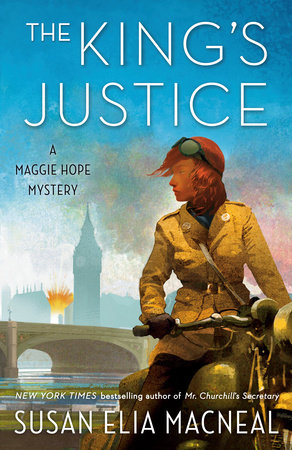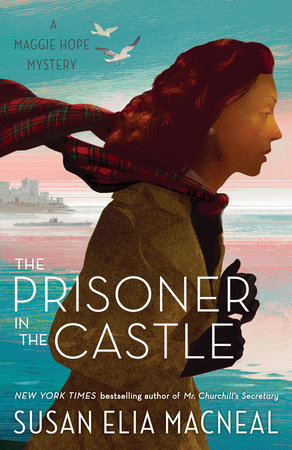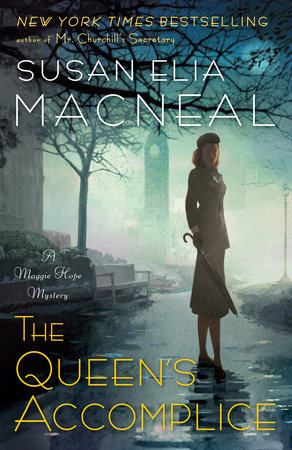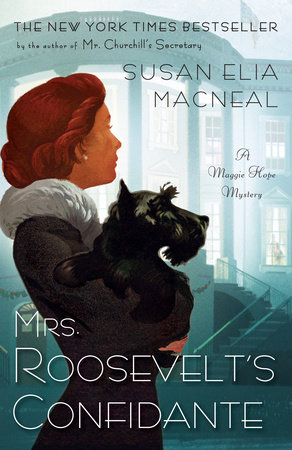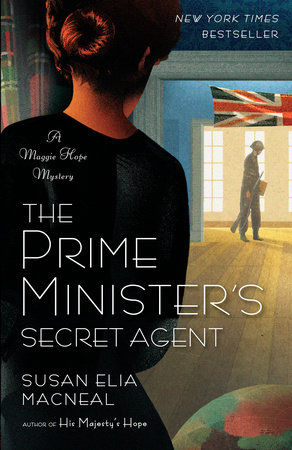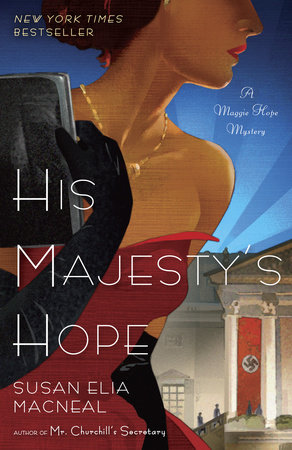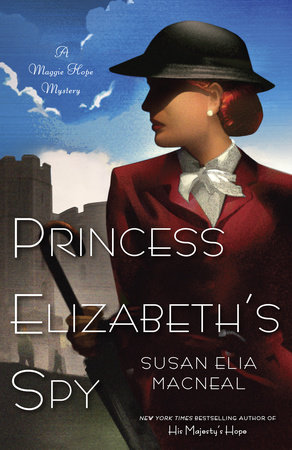Excerpt
The Paris Spy
Chapter One
n
The time was wrong.
Maggie Hope startled when the ormolu clock on the fireplace’s mantel struck the incorrect hour, metallic chimes ringing through the house’s chilly, high--ceilinged library. Heart pounding, she snapped her head to look over at it. Gilt Gemini twins flanked its pearlized face, and the thin black hands that should have been set to 1:00 Paris time were instead moved to 3:00—-the hour in Berlin. The Nazis’ first official act after the Occupation of France had been to impose the Reich’s time on the captured country.
What, she wondered, would Albert Einstein think of the arbitrary positions of the hands? Hadn’t he himself posited that time is only a relative construct? Of course, he never counted on the Nazis and their -hubris, she thought.
As a mathematics major at Wellesley College before the war, planning to pursue her doctorate at the Massachusetts Institute of Technology, Maggie had often speculated about such things—-time and space and numbers. Back then, her greatest ambition had been to become a professor of mathematics at one of the Seven Sisters colleges.
But she’d inherited her grandmother’s house in London in 1937 and stayed on, even as war broke out, to work as a typist for the new Prime Minister, Winston Churchill. After she solved a mystery regarding an IRA bomb plot, Peter Frain, head of MI--5, asked her if she spoke fluent German and French, and if she’d be willing to do more for her adopted country.
She’d said yes, without realizing exactly what that would entail.
Now, almost two years later, in June 1942, Maggie Hope was a British officer with the rank of major. Officially, she belonged to the Auxiliary Territorial Service, the all--female service known as the ATS—-as well as the one with the worst uniforms. But that was only a cover. In fact, she worked for a secret organization, the Special Operations Executive, responsible for deception and sabotage behind enemy lines. “Set Europe ablaze!” Prime Minister Churchill had thundered when he created the unit, and, across the Continent, his spies were doing their bit. At twenty--seven, Maggie was one of SOE’s more senior agents, although back at headquarters at Baker Street, her opinions and ideas were mostly ignored.
Before coming to France as an undercover agent, she’d never understood Salvador Dalí’s painting The Persistence of Memory. But now, after looking up endlessly at the gilt clock, she understood its warped imagery of time all too well.
She was in occupied territory, waiting for forged identity papers—-and if she were found out, she would be tortured by the Gestapo, then hanged as a spy. Maggie had been in Paris for three months, and every minute of every day since she’d arrived she’d been tracking shadows from the corners of her eyes, flinching at strange noises, and swallowing her meager meals with the constant threat of discovery and capture lodged in her throat. Worry was her daily diet, ever since she’d left London for Paris on a two--pronged mission: to discover the truth about what had happened to her half sister, Elise Hess, a German Resistance fighter in hiding, as well as her fellow SOE agent Erica Calvert.
Startling at the clock chiming the hour was nothing new. In her ever--vigilant state, she’d discovered the building had its own music: squeaking parquet floorboards, the rattle of windowpanes in the wind, and the melody created by each person who entered. Maggie had developed a well--tuned ear for the songs of the structure—-the pelt of raindrops against the glass, the creak of the foundation settling and resettling, the scuttle of rats in the walls. The strain of always listening was slowly driving her mad. To battle the tension, she kept the wireless on at a low volume, the music and conversation combating loneliness.
Maggie was staying, at least for the moment, in a three--story, nineteenth--century hôtel particulier in the first arrondissement, between the Louvre and Les Halles. It was the former residence of a princess, who’d left the city in the early thirties. A film actress had bought the townhouse—-then fled before the invasion. In the spring of 1941, the dilapidated structure was purchased by Dr. Maurice Charcot and his twin sister, Agathe, to use as both a physician’s office and private residence. In the year the Charcots had owned the building, they’d done little cleaning and repair, except for the doctor’s office, which was ordered and tidy, and an adjoining small living space for the two of them.
The rest of the manse, a once--elegant house with six bedrooms, was crammed with what the former occupants had abandoned. Armoires stuffed with moth--eaten costumes, hats, and shoes. A staggering disarray of broken furniture, grimy taxidermy, and stacks of mildewed books—-encyclopedias, dictionaries, Bibles, fairy tales—-were piled on the floor. Stag heads, their glass eyes blinded by dust, watched over rooms overflowing with unstrung chandeliers, broken Chinese bamboo birdcages, and murky oil paintings. An unraveling Aubusson tapestry of a captured unicorn moldered on one wall, while chipped marble statues of St. Francis of Assisi with upraised palms holding doves leaned against another in awkward positions. It was as if the house, like time, like Paris—-like France itself—-was sleeping under some malevolent spell.
Maurice and Agathe Charcot were with the Resistance, helping SOE. They let the British organization’s French Section use their empty rooms as a safe house, but made it perfectly clear that, if the agents were ever discovered by the Gestapo, both would claim ignorance of the entire operation.
When Maggie had first moved into the Charcots’ house, she’d made the unused library her own. After a thorough cleaning, it was now a pleasant space, tidy and orderly despite the crumbling, chalky blue walls and water--stained ceiling. She’d carried in a desk, a small round table, feather--stuffed chairs with only a few holes, and a long, lumpy, deeply buttoned sofa she used for a bed. A gilt--framed reproduction of Rubens’s Leda with the Swan hung above the fireplace’s mantel, a trifold screen padded with shabby velvet stood in one corner, and large grimy windows covered with heavy brocade drapes looked out to the street.
Maggie spent most of her time either doing the exercises she’d learned at Arisaig—-jack--knives, push--ups, sit--ups, and jujitsu—-or reading or working out math problems. A stuffed owl, whom she christened Athena, now held a place of honor on the desk, with its neat stacks of blotters in every kind of fabric, a rusty pen resting beside an inkwell, and a sheaf of papers with sketches of the birds she could see from the windows.
Yet no matter how much she cleaned and arranged and then rearranged her space, she felt utterly alone. What am I doing here? I should never have come. What on earth was I thinking? Sometimes she fantasized about abandoning the mission and going back to London. But she knew she couldn’t leave Paris—-at least not until she found out what had happened to Erica Calvert and to her own sister. Nightmares of their possible fates haunted her; she couldn’t return to her life in London until she’d done everything she could to find them.
Maggie picked her way across the chevron--patterned parquet floor, stepping over the squeaky spots, to the windows. She lifted the edge of a drape and peeked out at an angle—-making sure to remain hidden.
She watched as a young woman in the window of a flat across the street peered out in an almost exact mirror image. Who are you? Maggie wondered, while the slim girl with her flowered dress chewed nervously on one finger. And are you a resister or a collaborator? Or someone somewhere in between?
It was impossible to tell by looking. Maggie knew there were many who felt the deepest pain, sorrow, and humiliation over France’s loss. Open conflict was pointless—-it could lead to arrest and execution. So there were those Parisians who reacted to the travesty of the Occupation by keeping to themselves and avoiding contact with the Germans as much as possible.
There were many who made significant sacrifices—-workers who turned down well--paid positions with the occupiers, civil servants who refused to continue working under German command. There were also those, such as the Charcots, who sought ways to turn their anger into action. They waged their battles underground and in secret, publishing resistance tracts and hiding British agents.
Then there were those who were indifferent—-and, really, wishing only for the nightmare to be over. Like mourners who go to a funeral with feelings of grief, but leave with an inner sense of relief that the worst has passed. And there were Nazi sympathizers. Without openly confessing any allegiance to the Germans, this group thought Nazi rule had its positive side, especially in its ideas about Jews. That it was one’s patriotic duty to not only work with the Nazis but to show them the better side of France. At the very bottom were the lackeys, the thugs, the violent anti--Semites let off their leashes, who embraced Fascism with open arms.
As the sky grew darker, a greenish color, the girl across the street drew her curtain. Fat raindrops began to fall, and Maggie wrapped her thin wool cardigan around her. It was always cold in the library. She looked up and noticed a few shoots of buddleia sprouting from a gutter. Two plump pigeons with iridescent purple necks strutted and cooed in front of a row of chimney pots, undeterred by the wet weather.
She padded, catlike in stocking feet, back to her place at the round table, covered with the things she used to take her mind off the sense of impending doom she battled during the interminable days: a box of delicately painted bone mah--jongg tiles, a game of solitaire in progress, and the day’s newspaper.
As she sat down on a spindle--legged chair, her body curving like a question mark, she opened the thin, ink--smudged pages of Paris--Midi to see if any new measures were being implemented. Radio France segued from Maurice Chevalier’s “Toi, toi, toi” to Edith Piaf’s “Un coin tout bleu.” As the song ended, the staccato tapping of raindrops against the windowpanes picked up.
Maggie took a sip of cold catnip tea left over from breakfast as the announcer, Jean Hérold--Paquis, held forth in a blistering commentary, calling for the annihilation of the United Kingdom. A member of the French Popular Party—-one of the two Fascist parties allowed under the Occupation—-Hérold--Paquis was known for the catchphrase En-gland, like Carthage, shall be destroyed!
She rolled her eyes in disgust and waited for the next song. No one prepares you for the waiting. In her training as a secret agent and all of her subsequent missions—-in Berlin, in Scotland, even in London—-she’d learned to wait, counting out all the decimal points of pi she’d memorized or running Fibonacci’s sequence as far as she could go. But nothing can prepare you for the reality. The boredom and unease, mixed always with dread.
Although she hadn’t been out of the flat in weeks, the broadcasts on the wireless, as well as the Fascist French newspapers her hosts subscribed to as part of their cover, painted a picture of how much Paris had changed, as if the city were a princess sleeping under a fairy--tale curse.
Nineteen forty--two was almost half over; the year so far had been a cruel one. In Asia, the Japanese, heartened by their success at Pearl Harbor, seemed unstoppable. In Africa, the Desert Fox, Field Marshal Erwin Rommel, kept up the offensive. Not only had the Wehrmacht survived the Russian winter, but as the snows melted, it was forging ahead, crushing everything and everyone in its path. In the Atlantic, German submarines and ships were sinking all in their wake. Nazi power seemed to be at its peak. Hitler’s victory looked assured.
And in France there was, of course, the surrender. The armistice signed by Germany and France on June 22, 1940, was a one--sided agreement. In return for being allowed to administer part of a French territory without military occupation—-a concession that allowed the German Army to redeploy forty divisions and encouraged Marshal Philippe Pétain, Chief of State of Vichy France, to say “L’honneur est sauf . . .” or Honor has been saved—-France had to submit to all other demands. All German prisoners of war were freed immediately, while all French prisoners of war were to be held until the ultimate German victory. While 25 million people were living in the northern occupied zone, only 14 million were in the free zone, with its government, led by Pétain, in Vichy—-the de facto capital of southern, “unoccupied” France.
As a young woman taking French classes, Maggie had gone to the college library to read Le Figaro, France’s leading newspaper. Its motto, from Figaro’s monologue in the final act of Le Mariage de -Figaro, was Sans la liberté de blâmer, il n’est point d’éloge flatteur: Without the freedom to criticize, there is no true praise.
The august paper, whose writers had once included Albert Wolff, Émile Zola, and Alphonse Karr, had relocated to Vichy. But eventually the editors suspended its publication, resisting the censorship enforced by the Pétain government. All of the Paris papers, including Le Temps, had been shut down, and new, Nazi--approved ones had sprung up in their place. Maggie hated them, yet felt compelled to read, both out of a sense of needing to know the worst and to practice her cover story.
As the wind picked up, sending the rain sweeping sideways, her eyes fell on a headline: le france se libere du jong Juif—-france is freed from the jewish yoke.
She bit her lip as she read: The arrest of 5,000 foreign Jews between the ages of 18 and 45, and then their removal to Pithiviers and Beaune--la--Rolande, has begun. All of the Jews were dangerous without exception—-illegal traffickers on the black market who had become rich overnight. They are parasites who have finally received the proper though far too lenient punishment for their crimes against the long--suffering Aryan people. . . .
She couldn’t bring herself to finish.
Flipping through the pages, she spotted an advertisement for the Paris Opéra Ballet’s La Belle au Bois Dormant—-Sleeping Beauty. She knew two of her fellow SOE agents and friends, Sarah Sanderson, code--named Sabine Severin, and Hugh Thompson, now Hubert Taillier, were working on the production at the Palais Garnier, in their new identities as dancer and cellist, until they could carry off their own mission. Maggie felt a frisson of fear but disciplined herself to ignore it. Sarah and Hugh are smart and well trained. They’ll be fine. More than fine—-they’ll succeed in their job and make it back home, safely.
And when doubt nagged: They will.
The three agents had flown to Paris together on a small RAF plane, Maggie joining at literally the last moment. They had worked out all of their misunderstandings during the long flight. They were friends. They would all always be friends. And Maggie, despite her own past with Hugh, respected his and Sarah’s burgeoning romance.
The rest of the newspaper was filled with countless photos of a detached--looking Marshal Pétain, as well as chirpy reports about the horse races at Longchamp, the new film Mam’zelle Bonaparte, and the upcoming Parisian premiere of Richard Strauss’s Capriccio.
These were interspersed with articles on the so--called Fatherland, patriotism, and warnings against the dangers of Bolshevism. Travail, famille, patrie—-Work, family, patriotism—-had replaced the Republican motto of Liberté, égalité, fraternité.
The tone of the newspapers published under the Occupation wasn’t stoic or resigned but downright cheery; apparently, at least according to the articles, a new Europe was being built, helped by France’s finest. While some political power had been “temporarily ceded,” this transfer of power was lauded in the censored papers as a worthwhile maneuver.
But Maggie’s head snapped up when she heard the wireless’s disembodied voice intone: Field Marshal Pétain, Head of State, will address you now from the Hôtel du Parc in Vichy.
There was a knock at the double door, causing her heart to plunge in fear. “Come in,” she called, finally finding her voice. Her hosts entered the library. Agathe carried a tray with Maggie’s lunch, a bowl of steaming broth and a thin slice of what passed for bread. Maurice walked to the wireless to turn up the volume.
He was a dignified man, with a crisply trimmed white beard and mustache, wearing gray flannel trousers and a well--pressed shirt, a silk scarf tied around his neck. As he fiddled with the wireless’s dial, he gnawed at the stem of an empty pipe that still gave off the smell of fruity tobacco. Agathe put down the tray on Maggie’s makeshift desk.
“Merci,” Maggie said to her with a smile.


